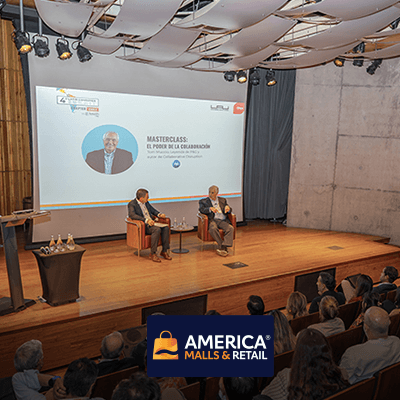Kimberly-Clark, Falabella, Procter & Gamble, and Juan Valdez, on how to win over the consumer
At a high-level panel, leaders from 4 major companies addressed the challenges of post-pandemic consumers, the relevance of purpose-driven brands, and the need to adapt without losing identity.
May 8, 2025
Within the framework of the 3rd Latin Consumer Summit, organized by Ohla with the participation of Retailers Magazine as media partner, prominent executives from multinational companies gathered to discuss structural changes in the behavior of the Latin consumer of the future.
The panel brought together representatives from major global brands. Gonzalo Uribe (Chief Transformation Officer at Kimberly-Clark), Juan Diego Valdés (Corporate Marketing and Sustainability Manager at Falabella), María Cristina Gómez (former Procter & Gamble and now an independent strategy and brand advisor), and Sebastián Mejía (International Vice President of Juan Valdez) who engaged in a deep and revealing conversation about the new Latin American consumer, their fluid behavior, and the transformation of marketing and brands in the post-pandemic era.
The conversation, which served as an editorial introduction to key industry topics, started from a clear premise: the consumer has changed radically. “We are facing a consumer who has become more complex, less loyal, and more informed. 80% of our consumers are 'light', intelligent, and seek a clear and relevant value proposition,” noted Uribe, who emphasized the importance of brands moving away from standardizing their offers and focusing on differentiation through purpose and local execution.
María Cristina Gómez shared an emblematic case from Procter & Gamble with the brand Always, which had to completely adapt its visual identity in China. “The color blue, which represents protection in Western markets, was associated with masculinity in China. Changing to red and adapting the message was key for Always to go from being irrelevant to a category leader,” she recounted. For Gómez, this type of transformation demonstrates that "a global brand promise must be executed in a locally relevant manner".
From the retail and platforms perspective, Juan Diego Valdés explained how Falabella has transitioned from a generalist approach to a more specialized model. “We discovered that consumers value the experience of a specialist brand; they do not want 'a bit of everything', but the best in each category. That is why today we bet on being the showcase for the best brands in fashion, beauty, and home, incorporating Latin American talent and giving visibility to regional designers,” he stated.
Sebastián Mejía, for his part, shared the lessons learned from taking Colombian coffee culture to markets as diverse as Denmark, Dubai, or the United States. “We had to adapt without losing essence. In Dubai, for example, stores must separate men and women; in the U.S., the experience is transactional; in Latin America, customers seek connection and hospitality. Listening to the market is the only thing that allows you to build a truly relevant global brand,” he indicated.
Another key topic was the need to act in the face of geopolitical uncertainty. Mejía recalled the direct effects of tariff decisions in the U.S. on the operation of Juan Valdez: “They imposed a 10% tariff on us, and we had to rethink our entire logistics and value proposition to avoid passing that cost on to the consumer. We learned that even in a crisis, if the experience is superior, the consumer is willing to pay.”
Towards the end, the panelists agreed on three key factors to win over the modern consumer:
Superior value proposition: clear, relevant, and adapted to each socioeconomic reality.
Deep understanding of the consumer: beyond what they say, understanding how they act, what inspires them, and why they choose.
Adaptability with identity: transforming without losing essence, reading the local context without renouncing brand purpose.
“Unified data will be the future,” concluded Valdés. “If you don’t know who your customer is when they switch channels, you lose the opportunity to connect. And in a market where the consumer decides with a click, every detail counts.”
This panel highlighted that winning over the Latin American consumer today requires more than creativity: it demands empathy, technology, a global vision, and, above all, authenticity.
Source: retailers



